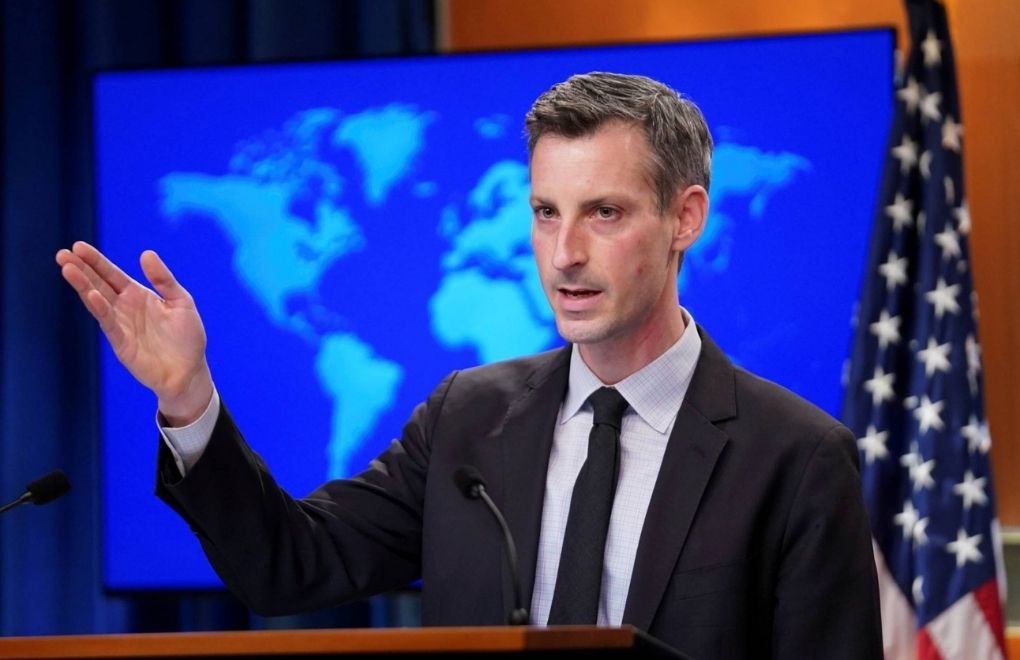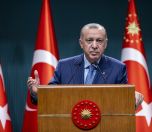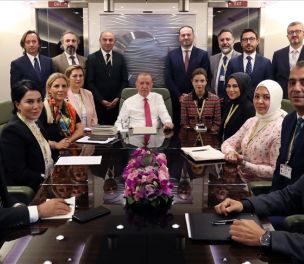Click to read the article in Turkish
US Department of State Spokepserson Ned Price answered the questions of journalists at a press briefing yesterday (October 25).
He also talked about the recent statement of the US Embassy in Turkey, stating that, "the United States notes that it maintains compliance with Article 41 of Vienna Convention on Diplomatic Relations" in response to the questions regarding the statement released by 10 ambassadors in Turkey calling for jailed businessperson Osman Kavala's release.
CLICK - Turkey summons 10 ambassadors to Foreign Ministry over their statement on Osman Kavala
In response to a question on the status of the current US ambassador in Turkey, Price said, "Ambassador [David M.] Satterfield is in Turkey. He is serving as the United States ambassador to Turkey. We've taken note of President [Recep Tayyip] Erdoğan's most recent remarks. We will continue to promote the rule of law and respect for human rights globally."
The Spokesperson added, "The Biden administration seeks cooperation with Turkey on common priorities. And as with any NATO Ally, we will continue to engage in dialogue to address any disagreements. We believe the best way forward is through cooperation on issues of mutual interest, and we know that we have many issues of mutual interest with Turkey."
CLICK - Erdoğan backs down: Our intention is never to cause a crisis
'Is the recent statement a step back?'
Ned Price was also asked a question regarding the fact that the recent statement of the embassies "was characterized in Turkish state media that the U.S. and these other countries took a step back." Asked whether the US "stands by the original statement", Price responded:
"What we issued was a statement to underscore that the statement that we put out on October 18th was consistent with Article 41 of Vienna Convention. We are steadfast in our commitment to promoting the rule of law, to promoting respect for human rights globally. This commitment is unwavering and we will continue to engage with Turkey as consistent with Article 41."
In a further question of "So, is it fair to say that you don't agree with Turkish President Erdoğan's characterization that this is a step back," US State Department Spokesperson Price reiterated:
"What we issued was a – was to underscore that the statement that we issued with nine other embassies on October 18th – that, very simply, it was consistent with Article 41 of the Vienna Convention.
"The principles that we have put forward in the context of Turkey and also around the world – those are principles that we are committed to."
Price was also asked whether the US "will continue to ask the government of Turkey to implement the judgments of the European Court of Human Rights (ECtHR) or not in the context of this".
"We are as committed to human rights in the context of Turkey as we are anywhere else around the globe," answered Ned Price.
In response to another question on the US position on the first statement, Price said, "The statement was published on October 18th. That was less than a week ago. So the principles, the commitments that are in that statement, those are universal principles and commitments that the United States shares – that we share in this case with the nine other signatories."
When asked in reference to the G-20 Summit in Italy on October 30-31, "Does the State Department have any information whether after this saga Biden will meet with President Erdoğan in Rome," Price answered, I would leave that to my White House colleagues to address.
What happened?
October 18, 2021 marked the fourth year since the businessperson and rights defender Osman Kavala was detained in Turkey.
On this occasion, the embassies of 10 countries released a written statement calling for his release by specifically referring to the European Court of Human Rights (ECtHR) rulings about his case.
Shortly after this statement was shared with the public, some ministers and ruling Justice and Development Party (AKP) politicians denounced it. The state-run Anadolu Agency (AA) also reported that the ambassadors of the 10 countries had been summoned to the Ministry of Foreign Affairs of Turkey over their statement calling for Osman Kavala's release.
President and AKP Chair Recep Tayyip Erdoğan also slammed the ambassadors of 10 countries, including the US, Germany and France, who had called for the release of Osman Kavala.
"Why do these 10 ambassadors make this statement? Those who defend this leftover of [George] Soros are striving to get him released," Erdoğan said upon his visit from Africa and briefly added: " "I told our foreign minister that we can't have the luxury to host those in our country. [...] Is it your place to teach lessons to Turkey? Who are you?"
"The European Court of Human Rights (ECtHR) gave a decision. They want to convict Turkey regarding this Soros leftover," Erdoğan remarked. "Do you release bandits, killers or terrorists in your country?"
In response to these remarks, Osman Kavala sent a message from prison and briefly said, "Under these circumstances, as there has remained no possibility for a fair trial, I believe that my participation in the hearings and presenting a defense would now be meaningless."
In another speech on October 23, Erdoğan said that "he had ordered 10 ambassadors to be declared persona non grata."
"I gave the necessary instructions to our minister of foreign affairs. I told him what to do. I said that you will deal with these 10 ambassadors being declared persona non grata as soon as possible," Erdoğan said.
President and AKP Chair Erdoğan added that "the ambassadors should leave the country if they do not understand Turkey."
After Erdoğan announced that 10 ambassadors who called for Osman Kavala's release would be declared "personae non gratae" in Turkey, a new development occurred on October 25.
The US Embassy in Turkey posted a brief message on its Twitter account, saying in Turkish and English: "In response to questions regarding the Statement of October 18, the United States notes that it maintains compliance with Article 41 of Vienna Convention on Diplomatic Relations."
"Without prejudice to their privileges and immunities, it is the duty of all persons enjoying such privileges and immunities to respect the laws and regulations of the receiving State. They also have a duty not to interfere in the internal affairs of that State," the Article 41/1 of the Convention says. (TP/SD)











